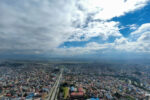KATHMANDU: Nepal Forum of Environment Journalists (NEFEJ) has disapproved of the government announcement to pursue the aggregates mining industry so as to reduce the trade deficit.
The government in the budget speech for the upcoming fiscal year (2021-22) on May 29 announced that the trade deficit would be reduced by exporting rock, gravel, sand and other aggregates. The NEFEJ reached the conclusion that quarrying in the name of bridging the gap of trade deficit was good for the nation from neither an economic nor social point of view.
The national forum of environment journalists has protested the government program citing that it was brought without any (scientific) study and assessment of its impact on the environment.
In a press statement today, NEFEJ argued though the budget did not mention Chure or Shiwalik Hill, the studies were enough to show that the Chure region would bear the brunt of this kind of program.
Chure belongs to the youngest mountain system and is fragile as well due to its geographical structure and it is the closest to the southern border. It stretches to 36 districts from Ilam to Kanchanpur district. The then government had on 16th June, 2014 banned quarrying and export of rocks, stones, soil, gravel, and sand from the area bearing in mind the rampant degradation of Chure region and its implications on the dependent people. The move was based on the research-based recommendation of a parliamentary committee.
The press release states that the government has at point number 199 of the budget statement mentioned lifting the ban on the export of aggregates. The land in Tarai and Inner Tarai would turn into desert, there would be an acute crisis of water and a decrease in production soon after the destruction of Chure, affecting the overall life of Madhesh, said NEFEJ.
Similarly, NEFEJ welcomed the arrangement made at points 160 and 161 of the budget. Saying the ban on the production, import, sale, distribution, and use of polythene less than 40 micron is appropriate, the NEFEJ requested the bodies concerned to make the implementation of this provision effective.
The provision made earlier to ban production, sale, distribution, and use of polythene less the 20 microns has not yet become effective.
The NEFEJ welcomed the government’s announcement of providing exemption of renewal charge till five years to the petroleum vehicles changing into electric vehicles and reducing the customs duty.
RSS









Comment